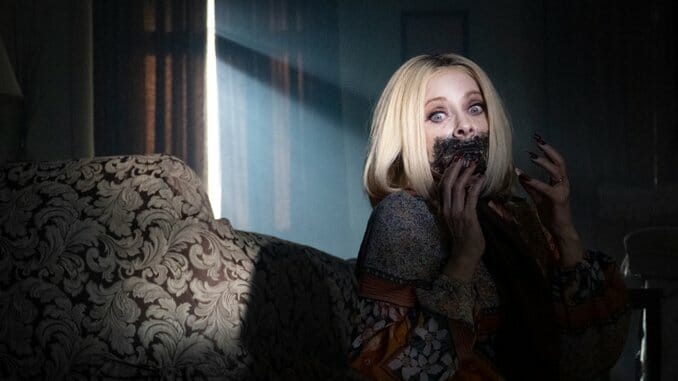A Career-Best Barbara Crampton Dominates Uneven Jakob’s Wife

Vampires are a horror staple. These blood-sucking fiends are a tale as old as time, but despite their popularity, they’ve lost their spark with cliché stories that don’t bring anything new to the table. But the paradigm is shifting in favor of these creatures of the night with films such as writer/director Travis Stevens’ Jakob’s Wife, an unconventional and uneven vampire tale all about immortality as freedom rather than a damning prison.
Jakob’s Wife is centered on Annie Fedder (Barbara Crampton), whose husband is Pastor Jakob Fedder (Larry Fessenden). She lives a quiet existence, making breakfast for Jakob, cleaning, gardening and being the perfect vision of a preacher’s wife. She essentially blends in with the wallpaper, nodding her head and doing what will make her husband happy. Yet, she longs for more. She used to want to travel and explore the world; now, after letting the years pass her by, Annie feels trapped in her small town life. But this is all about to change.
Annie is accosted by a vampire known simply as “The Master” (Bonnie Aarons) who transforms this pastor’s wife into an empowered and confident woman who wishes to exist as her own person. Yes, she does have to consume blood for survival, but it seems like a small price to pay for her freedom. When Jakob discovers Annie’s secret, he embarks on a mission to save her from this immortal fate…but maybe Annie does not want to be saved.
More than just a vampire movie, Jakob’s Wife is about trying to escape domesticity and the trappings of a middle-aged married woman’s everyday life. Vampirism is often used as a metaphor for things such as infection (30 Days of Night), power over others (Dracula), sex (Interview With a Vampire) and more. Here, Stevens depicts vampirism as something liberating rather than harrowing. It’s exciting to see a horror movie centered on a woman who isn’t a hot young wife, but rather a woman three decades into her marriage with a cemented routine and years of resentment.
Yet, this unique and fascinating vampire premise utilizes a lot of filmmaking tropes about a quiet woman becoming empowered and transforming from frumpy to sexy that threaten to make Jakob’s Wife cliché. At first, Annie wears her hair back in a low bun, pastel cardigans buttoned up to the neck, modest skirts and nondescript brown shoes. Then, after her bite, her hair is straightened, her dresses are now low-cut and exposing cleavage, she wears make-up and exudes a new confident energy. This kind of transformation is easy to follow but is overwrought, as if aesthetics and outward appearance are all that matter to constructing confidence. Without a discussion about Annie’s love of such clothes or her excitement to finally express herself the way she used to/wants to, this moment feels like a stereotypical makeover moment from a romantic comedy where a bit of lipstick and a hair dryer change a woman’s life.
-

-

-

-

-

-

-

-

-

-

-

-

-

-

-

-

-

-

-

-

-

-

-

-

-

-

-

-

-

-

-

-

-

-

-

-

-

-

-

-








































